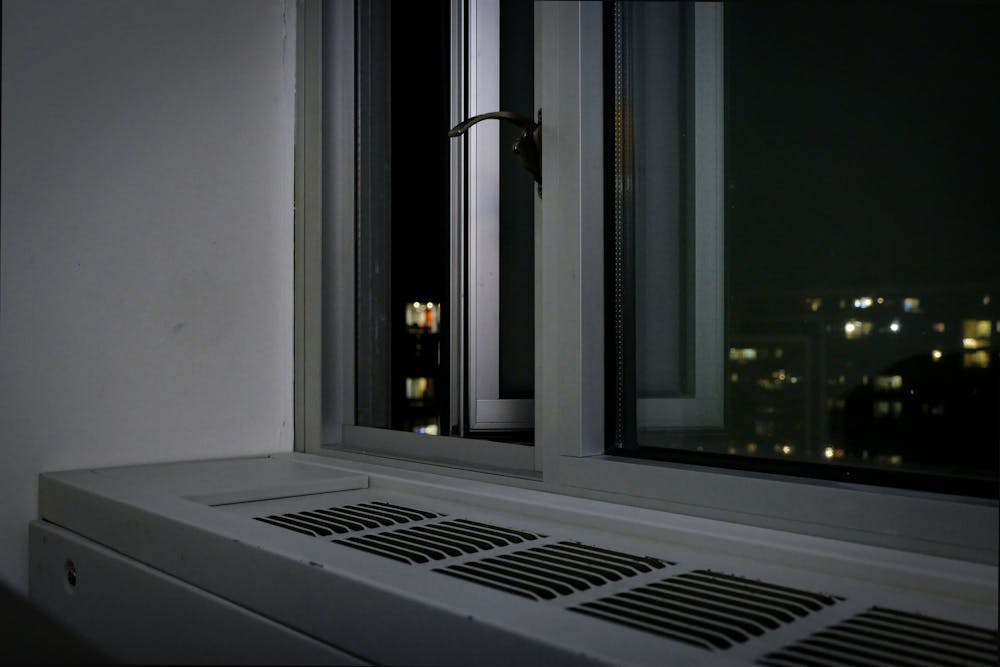
Students living in on-campus housing are facing excessively high temperatures in their rooms, which they say has adversely affected their physical ability to comfortably work and sleep.
When the University switched the air conditioning systems to heating systems in mid-October, students living in high rises and New College House West experienced temperatures reaching what they said felt too warm.
College sophomore Alexandra Shank, who lives in Rodin College House in a four-person suite, said her bedroom has floor-to-ceiling windows that makes the room feel like a “sauna” on certain days. Shank believes that room numbers in the high rises ending with "-03" have walls made mostly of windows, which she says let in a lot of heat.
Students who reported their rooms being warm were generally those whose rooms have a southern exposure and receive a lot of afternoon sun, Barbara Lea-Kruger, director of Communications and External Relations, wrote in an email to The Daily Pennsylvanian. There is currently no plan to change the current HVAC system as a whole, she wrote.
Room temperatures left some students, including College sophomore Jules Pearson, unable to sit in their apartments and do homework during the day. Pearson she felt forced to go to the library or another space on campus to do work.
“I started to have headaches. I would feel very sweaty. And just kind of like I was in a pressure cooker,” Pearson, who lives in a four-person suite with Shank in Rodin, said. “When I would walk in the door, I would just be overwhelmed by heat.”
Shank similarly said the indoor heat has hindered her and her roommates from studying and eating lunch in their rooms, now choosing to instead go to the student lounge on their floor, the high rise rooftop lounge, and libraries on campus.
“I get headaches and I feel really sleepy. And it's just entirely too hot to spend certain hours in there,” Shank said. She added this was frustrating when she needed to record videos for class assignments or attend meetings.
The high temperatures carried into the night as well, which made it challenging for some to sleep. College sophomore Ganen Chinniah, who lives in Harrison, said the nighttime heat and humidity in his room had a negative impact on his sleep quality.
Students in New College House West experienced similar heat levels to those in the high rises.
Engineering sophomore Rohan Epur, a NCHW resident, said his bedroom is set at 75°F and can only be adjusted by three degrees up or down.
“[Even] if we set it all the way down, it just randomly resets to the middle, like after a couple of hours,” Epur said.
Even though he talked to the NCHW front desk, as well as his resident advisors and graduate associates, about the problem and was told they would look it, Epur said nothing has improved so far. When Pearson lived in Hill last semester, she said the college house offered residents fans to use when it started getting hotter towards the end of the semester.
“Even with the fan in the hot room, it's still too much, so I have to keep the windows open,” Epur said, adding that he has sometimes woken up sweaty and with a sore throat. “I tried using lighter sheets, and then I tried using none at all, which is uncomfortable, but even then it was still too hot.”
Students are buying fans and keeping their windows open to maintain the heat levels, but say this leads to other distractions seeping into their rooms, like insects and street noise. Lea-Kruger wrote to the DP that Residential Services can provide students, who request it, a box fan to help pull air from the outside in if they open their windows.
Students said they would have appreciated if Penn surveyed residents’ opinions before shifting the air conditioning system to heat.
“I feel like it is kind of one of those silent suffering issues that doesn't get a lot of attention,” Pearson said. “I also wish that somebody had told me before I moved into the high rises that this might be a potential consequence of living here.”
The Daily Pennsylvanian is an independent, student-run newspaper. Please consider making a donation to support the coverage that shapes the University. Your generosity ensures a future of strong journalism at Penn.
Donate







